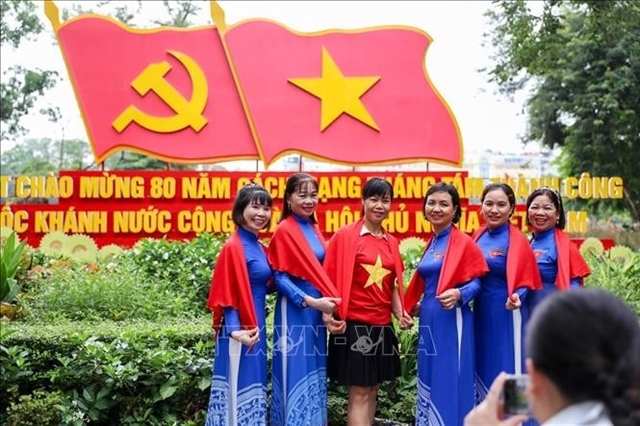In an interview with the Vietnam News Agency (VNA)'s resident correspondent on the occasion of Vietnam's 80th National Day (September 2), he recalled how Vietnam emerged from war with an exhausted economy, where more than 90% of the population depended on subsistence agriculture, while facing economic embargo and political isolation. In less than four decades, the county transformed into one of Asia’s most open and dynamic economies, maintaining an average GDP growth of 7% annually – a development miracle rarely seen in modern history.
    |
 |
|
Hanoi residents pose for a photo on the occasion of the 80th anniversary of the August Revolution and National Day. |
One of the clearest indicators of this transformation lies in Vietnam’s economic structure. In 1986, agriculture accounted for more than 40% of GDP but today it drops to below 12%, making way for manufacturing and services. The country has become a global production hub for electronics, textiles, footwear, and processed agricultural goods, with exports surpassing 370 billion USD in 2023. This demonstrates Vietnam’s successful shift from a traditional agricultural economy to an integral link in global supply chains, he said.
He described the capability to lure foreign direct investment (FDI) as a crucial pillar for growth. Total FDI capital now surpasses 450 billion USD, injected into the domains of technology, electronics, and manufacturing – processing, with multinationals like Samsung, Intel, LG, Foxconn and Toyota establishing major operations.
Vietnam and Indonesia have been magnets for FDI, Anthoni said, stressing while Indonesia leverages its vast domestic market, Vietnam stands out for its political stability, skilled workforce, competitive costs and commitments to international integration.
According to the journalist, diplomacy has also been a pillar of Vietnam's success. The flexible policy with steadfast principle of independence and self-reliance has helped the country balance its relations with powers, establishing comprehensive strategic partnerships with China, the EU, India, Japan, Russia, and the US. Hanoi’s hosting of leaders from Washington, Beijing and Moscow within a short period underscored its rare diplomatic agility, strengthening what Anthoni called Vietnam’s “strategic autonomy” amidst fierce competition between major powers.
Anthoni cited a recent report from the U.K.’s Centre for Economics and Business Research predicting that Vietnam will surpass Thailand to become Southeast Asia's second-largest economy by 2028, trailing only Indonesia, and will enter the world's top 20 economies by 2036. This could position Vietnam and Indonesia as “twin pillars” of ASEAN, with Indonesia relying on its large domestic market and Vietnam on export, international integration, and manufacturing.
According to the journalist, the similarities in the development journeys between Vietnam and Indonesia make their bilateral ties even more meaningful. Both rose from colonial pasts, share aspirations to build independent, self-reliant, and modern states, while demonstrating their high adaptability to global changes through economic reforms and skillful foreign policies.
He stressed that Hanoi – Jakarta close cooperation could help ASEAN maintain its central role in the Indo-Pacific structure, adding they boast huge potential for collaboration in the areas of trade, investment, energy transition, and maritime security.
Anthoni emphasized that Vietnam's success is not accidental but is rooted in a development philosophy where political stability serves as the foundation, economic reform as the driving force, international integration as the means, and people as the center.
Source: VNA